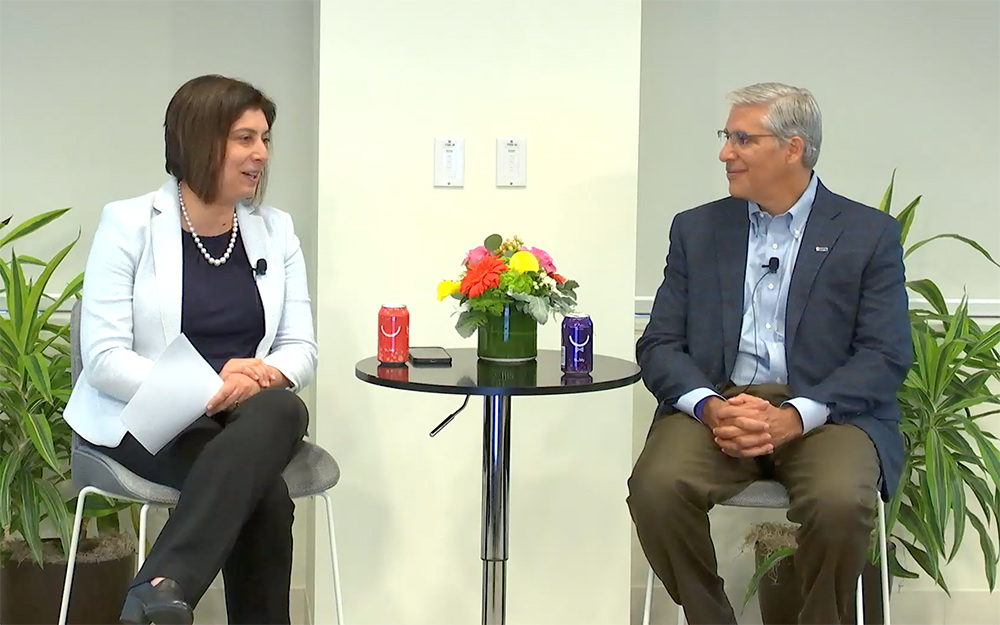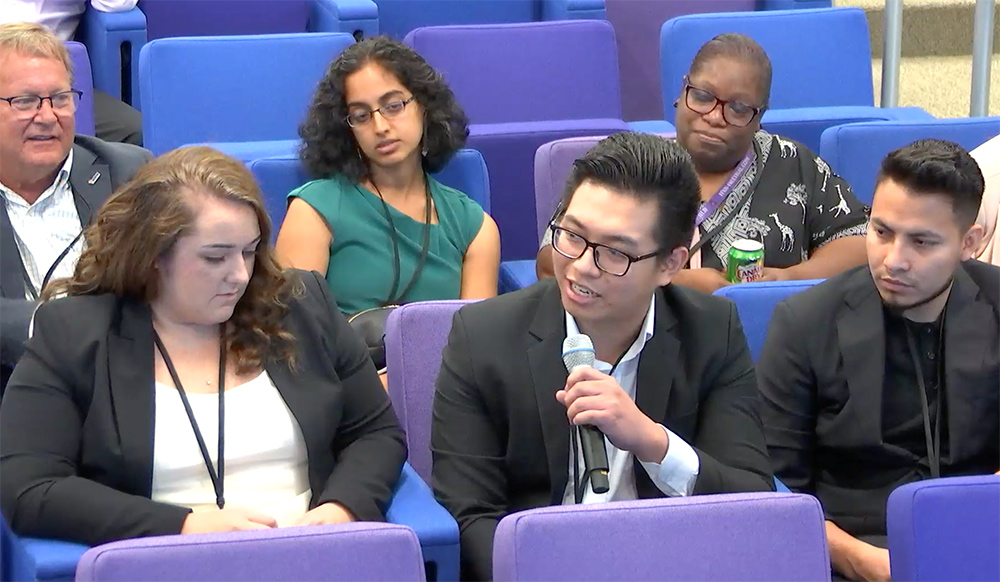This summer, Vertex hosted an engrossing conversation between Reshma Kewalramani, Vertex’s CEO and President, and Gerald Chertavian, Founder and CEO of Year Up, covering everything from how Gerald got his “year up” — an opportunity where someone took a chance on him and changed the trajectory of his whole life — to the long-term partnership between the two organizations.
Year Up’s mission is to close the Opportunity Divide by ensuring that young adults gain the skills, experiences and support that will empower them to reach their potential through careers and higher education. They are committed to ensuring equitable access to economic opportunity, education and justice for all young adults — no matter their background, income or zip code. Founded by Gerald in 2000, they currently have 35 campuses across the U.S. and have served more than 34,000 students so far.
Vertex and Year Up have been partners for years. Last year, in the wake of the George Floyd murder, and Vertex’s commitment to invest more in inclusion, diversity and equity, Vertex deepened its partnership and established a first-of-its kind biotech program with Year Up.
Read on to learn more from the conversation between Reshma and Gerald.

The Opportunity Divide
Reshma: Tell us a little bit about where you were born and raised, and how you got your year up.
Gerald: I’m originally from Lowell, Mass., and I went to public school my whole life. And then I had my own year up, where a gentleman plucked my brother and I both out of Lowell High School, and he said, “You know what? You need to go to this college.” I didn’t even know how to pronounce the name. And I remember thinking, I don’t even know why I’m here. My parents never mentioned the word [college].
I had my year up through a gentleman who paid attention to someone else, and it was never lost on me that it wasn't because I was any better or smarter — I had a year up. I had an opportunity. I had someone who paid attention and supported me. And that's at times very serendipitous in this country, and it shouldn’t be that way. When we say “opportunity for all” or the “land of opportunity,” that shouldn't be serendipity or race or socioeconomic status that defines whether land of opportunity applies to you.
Here’s what’s interesting. You can catch up and learn anything you want. And every one of our students and our young people out there, know that to be true. You can learn whatever you set your mind to learn. I promise you that.
Reshma: One thing that is really important is to put both numbers and statistics to the opportunity gap. Why do you think it’s important to reshape how we think about education?
Gerald: Back in the ‘80s, this country said, “education for all,” and our mental model became a four-year degree, fixed term, residential. We thought, go to college at 18 and gradate at 22. But here’s the fact. Only one out of eight Americans over the age of 22 have a four-year degree that they got between the ages of 18 and 22. Yet we’ve set that up as the only source of success.
Many companies require a four-year degree to apply. However, when you say you need a four-year degree to apply, you’ve just excluded ~80% of Latinx and ~70% of Black people in America.
Year Up
Reshma: What made you decide to start Year Up?
Gerald: I've been a Big Brother for 38 years now. After college, when I was working in New York City, I got matched with a boy who lived in what was the most heavily photographed crime scene in New York City. I was working on Wall Street, and I spent every Saturday in this housing development and got to know a young boy who was 10 years old. After three years of Saturdays, my life was fundamentally different because I saw that this boy — and his brothers — were so smart, so capable, so able, but they didn’t know how to put all their energy into productive motion.
I started to realize — bank balance, the color of their skin, the school system and his zip code were fundamentally impacting what he got to do in his life. It wasn’t about ability. It just struck me, this is so wrong to live in a country that espouses land of opportunity, when I know that we are wasting the best human capital we have for all the wrong reasons. And that burned in me. At that point I was in my early 20s, and I thought to myself, “There's got to be a better way to close this opportunity divide. It’s not just. It’s not fair.” So my best teacher was a 10-year-old boy from the Dominican Republic who taught me about the reality of this country and gave me some courage to say, “Perhaps we can do something about it as a country.”
Reshma: Tell us about Year Up. It’s been 20 years of its existence, and you have great stories to tell about individuals whose lives have been completely transformed through their experiences in Year Up. And because it's now a 20-year-old organization, they're doing great things for society.
Gerald: Year Up has always been about providing young people with what they need, which is both the hard skills and the soft skills they need to be successful. That’s traditionally been six months of training, though we’ve figured out ways to do it faster and will continue to innovate. In Vertex’s case, that includes biology, chemistry and quality assurance. Equally as important as the [technical] skills are what we call the ABCs — attitudinal, behavioral and communication skills. The ABCs matter because I know companies like Vertex will say, “If you bring to me a willingness to learn, you show up, and you play well in a team, we'll teach you everything you need to know.”
After the first six months of training, we place folks into an internship, where they can show what they can do. This is a way for our young adults to be seen for what they can do and who they are and how hungry they are.
The model of Year Up is good training, working with a great partner like Vertex, relevant skills, and then 34,000 students later, the results we have. I’m so proud to say, and this is really a tribute to our students, Year Up has raised wages for low-income young adults more than any other program in the history of the United States. And we’ve got tens of thousands of young people in communities across this country who will be the leaders we need to create a more pluralistic, more equitable, more inclusive country.
The first biotech curriculum
Nia Tatsis, Ph.D., Executive Vice President and Chief Regulatory and Quality Officer, has been leading the first class of 10 students participating in the biotech program. The students have been immersed in Vertex’s mission and culture and challenged to unleash their intellectual curiosity, all while learning the crucial skills needed to pursue a successful career.
 Reshma: Today, we have the first class of biotech students who've been working alongside our quality organization and are going to come on and do an internship with us. And I sure hope they’ll stay with us over the long-term and have a long and enduring career right here at Vertex.
Reshma: Today, we have the first class of biotech students who've been working alongside our quality organization and are going to come on and do an internship with us. And I sure hope they’ll stay with us over the long-term and have a long and enduring career right here at Vertex.
Gerald: Just being willing to say, "You know what? We can do this," and create conditions where that innovation around human capital can happen. Our gratitude and appreciation is to Vertex in your leadership to create the space for something like this to actually happen.
I think you should all know that Vertex has always taken an industry view of this. They said: “We'll be the start at Vertex, but we don't see it as IP unique to us. We actually believe this is good for our industry. And so therefore, how do we share this? How do we get others involved?”
Not all companies do that. Not everyone thinks, “What does the industry need to be healthy, to develop the talent from all communities so we can be the best companies?”
Reshma: I would love to hear from one of the Year Up students. Can you speak to your experience at Year Up?
Maggie: I was a project management student, now on the biotechnology track. Overall, Year Up has completely changed my life — the way that I see myself, the way that I deal with problems, my motivation level. Before Year Up, I didn't know what I was going to do with my life. Coming into this program, I just feel really grateful for the opportunity that it's given me and how it’s shown me all of these different career paths that I can take. And coming into biotech — never in a million years did I think I could be in an industry like this — so to have the opportunity to learn all of that has been really amazing.

